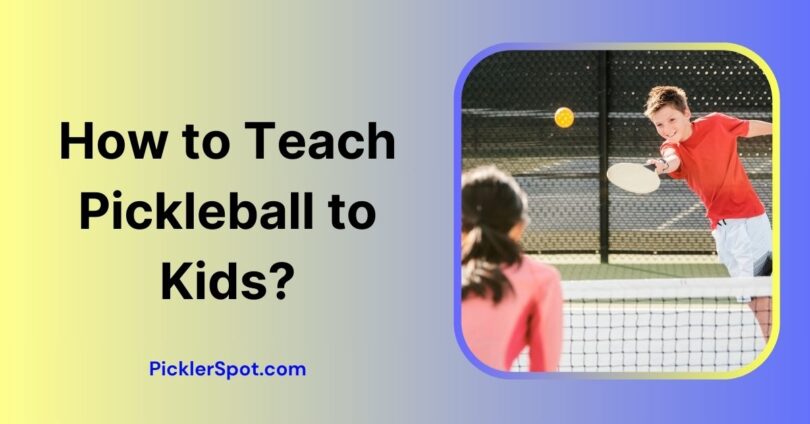Tired of kids having their minds and focus fixated on those pesky screens? Is the sound of “cocomelon” on repeat driving you insane and after all these, you want to train them from couch potatoes to pickleball powerhouses?
Well, consider resorting to this guide on How To Teach Pickleball To Kids that opens a gateway to fun, fitness, and a highly beneficial physical curriculum that will have your kids hooked up faster than they could say “volley”.
So giddy up your little champs, they are about to have the best possible experience in their life for which they will thank you whenever they are well-sprouted and grown-ups.
Teaching Kids How To Play Pickleball
It’s a fun little sport designed to cater to almost everyone, so I would advise you to take it slow and take one step at a time when schooling your little ones. At first, it might seem like a challenging feat but trust me once they get a hold of the sport, they will be rushing to courts on a whim.
1. Pickleball 101: Starting From Basics
As mentioned above, kids like to take routes that are more feasible to them and might not align with the norms adults usually take. In that case, allowing them to learn the basics right from scratch by moving one step at a time.
Never overdo or make things a chore whenever you are coaching a child, otherwise, they will never get a hold of basic rules and regulations. Take frequent evaluation tests such as Quizzes and evaluation tests such as mini-games that encourage them as they move through the learning curve.
Pickleball might be a straightforward game with lenient rules, nevertheless, you still need to keep the emphasis on how important they are whenever you are providing coaching classes to little ones who barely have an idea about this sport.
2. Teaching The Rules
Speaking of which, since children don’t really have prior experience with other sports, you need to show plenty of patience so they can also learn and integrate the same level of sportsmanship and patience whenever they grow up.
Always remember, children learn directly from whom they look up to, try to be a fair yet just role model because at the end of the day knowing the spirit of the game is highly important as it defines the quality of a person.
You could also penalize kids whenever they try to break rules, in that way, they will develop a sense of responsibility whenever they are violating the code of conduct.
3. Zones? What Are They?
Once you have determined that the kids have learned the ropes of Pickleball, it’s time to move to a more advanced setting. In the court, knowing your whereabouts is incredibly crucial especially if they are teaming up in a session.
Try to draw a map of the court on a piece of paper and label each zone so that they can attain an idea of how the zones of the court work. Make sure you also define the dimensions and specifications of the place and ensure they memorize it since it plays a pivotal role in building muscle memory and form, regardless of the fact that you are playing indoors or outdoors.
In fact, if you are looking to kick start their professional career, coaching them above the zones as well as the net height and its surroundings is incredibly important.
4. Getting The Right Gear
If you want to implement a proper professional attitude in the court and want your kids to give their best, you need to make sure everyone is dressed up for the occasion.
Make sure you ditch the “pajamas and slippers” and grab something for your kids that is athletic and has enough traction so they can easily maneuver through the court.
Moreover, getting the right gear also implies that you get your hands on pickleball paddles which aren’t too bulky as they may cause unnecessary fatigue in the hand start by using mini wooden Paddles.
After all, they are going to learn backhand swings, grip styles, Dinks, lobs, stacking and another form of counter which will require plenty of energy as they will be required to spend hours on the court to get better at the game, it’s in other words use something that is cheap yet lightweight that will help them train their muscle memory effectively.
5. Reinforce Their Confidence
Even though pickleball has a lenient learning curve, nevertheless, for kids with no sports background will often struggle with keeping up the pace. Never try to nitpick their mistakes, especially in the early stages as it could negatively affect their morals which might become a huge hurdle during the development stages.
In sports, confidence plays a huge role in an athlete’s mindset, and in order to build it you need to show signs of appreciation and give rewards whenever they perform well in quizzes and rallies.
Avoid scolding or unnecessary sledding, make sure you only use constructive criticism and use it as a tool to positively reinforce your child’s mindset.
6. Maintaining Discipline
Kids have a habit of going out of line whenever they are monitored every now and then. Being a mentor and a trainer, it’s in your best interest that you ditch the “silly” attitude out of the court. While playfulness and fun routine could eliminate toxicity and encourage learning, too much casualness could render the whole training counterproductive as they will no longer take the game seriously.
Always remember that pickleball just like every other sport is a game that also doubles down as a physical activity which reaps tons of healthy benefits, so the sooner you indulge them in such extracurricular activities the better they will become.
How to Teach Pickleball to Kids? – Bottom Line
Remember, teaching kids playing pickleball might be a challenging feat but once they are hooked on it, they will easily climb the learning curve because kids easily adapt to something whenever something piques their interest.
But that is only possible through positive reinforcement and creating a reward system where each kid is evaluated based on their performance and to produce fruitful results make sure you also hold healthy competition so they can work on their skills all while keeping the spirit of the game alive.
At the end of the day, it’s your sole responsibility whenever you are coaching your kids as they will always look up to you and follow in your footsteps, so it’s best that you portray yourself as a true gentleman and value discipline over anything else.









